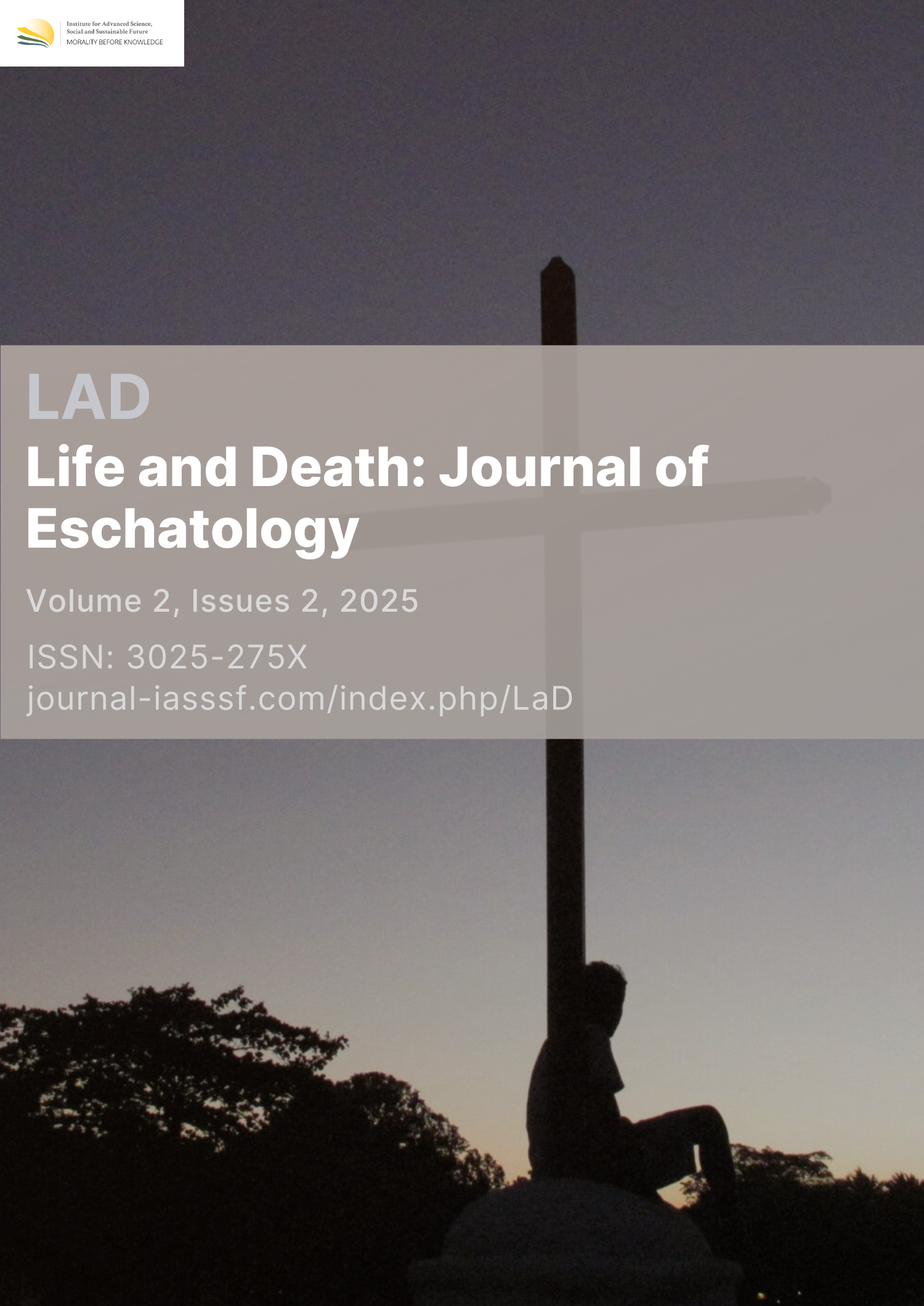Fides quaerens intellectum, hindu divine philosophy and its relevance to religious moderation in Indonesia
DOI:
https://doi.org/10.61511/lad.v2i2.2025.1258Keywords:
fides quaerens intellectum, moderation, philosophy of the godhead, St AnselmAbstract
Background: The relationship between faith and reason has been a topic of interest in both religion and philosophy. In the Western tradition, they are often viewed as distinct and difficult to reconcile. However, Hinduism emphasizes the synthesis of ritual (karmakāṇḍa) and knowledge (jñanakāṇḍa), which integrates human intellect with divine understanding. Objective: This paper explores the concept of faith and reason in both Western and Hindu philosophy, specifically looking at how these ideas are interconnected and how they influence the development of global citizenship, unity, and interfaith harmony. Methods: The study uses a comparative approach, analyzing key figures such as St. Anselm in Christian philosophy and Ādi Śaṅkarācārya and Swami Vivekananda in Hindu philosophy. The research examines their ideas on the synthesis of faith, reason, and intellect. Findings: The findings show that in both traditions, faith and reason are not mutually exclusive but are complementary. St. Anselm’s Fides quaerens intellectum and Śaṅkarācārya’s doctrine of unity promote a harmonious relationship between theology and philosophy, suggesting that reason and intellect strengthen faith and belief. Conclusion: The synthesis of faith and reason in both Western and Hindu philosophy supports the development of a global citizen who embraces diversity without conflict. Both traditions emphasize the importance of human intellect and reasoning in spiritual practice and understanding, highlighting the universal value of unity. Novelty/Originality of this article: This paper presents a unique comparative analysis of faith and reason in Western and Hindu philosophy, emphasizing their complementary roles in fostering interfaith dialogue, intellectual growth, and global citizenship.
References
Adams, M. M. (1992). Fides Quaerens Intellectum: St. Anselm's Method in Philosophical Theology. Faith and Philosophy, 9(4), 409-435. https://doi.org/10.5840/faithphil19929434
Aryadharma, N. K. S. (2019). Vedānta dan Metode Pemahaman Filsafat Hindu. Paramita.
Avalokitesvari, N. N. A. & Gunawijaya, I. W. T. (2023). Nāgarakṛtâgama political philosophy and its relevance to Indonesian defense diplomacy today. Journal of Socio-Cultural Sustainability and Resilience, 1(1), 32–43. https://doi.org/10.61511/jscsr.v1i1.2023.209
Barua, A. (2018). The science of the self (ātmavidyā): the reconfigurations of Vedāntic gnosis in Hindu modernities. South Asian History and Culture, 9(3). https://doi.org/10.1080/19472498.2018.1488362
Bhattacharya, A., Shenolikar, S., & Hebbani, S. (2023). Exploring the significance of Indian logic in overcoming contemporary limitations in the Indian education system. Asia Pacific Journal of Education, 43(3), 805-819. https://doi.org/10.1080/02188791.2021.1987186
Blackburn, S. (2005). The Oxford dictionary of philosophy. OUP Oxford. https://doi.org/10.1093/acref/9780199541430.001.0001
Dorman, T. M. (1997). Fides Quaerens Intellectum: The Soul of a Christian University. Southern Baptist Journal of Theology, 1(3). https://cdn.sbts.edu/media/publications/sbjt/sbjt_1997fall6.pdf
Durban-Albrecht, E. (2013). The legacy of Assotto Saint: Tracing transnational history from the gay Haitian diaspora. Journal of Haitian Studies, 19(1), 235–256. https://doi.org/10.1353/jhs.2013.0013
Fahri, M., & Zainuri, A. (2019). Moderasi Beragama di Indonesia. Intizar, 25(2). https://doi.org/10.19109/intizar.v25i2.5640
Geanellos, R. (2000). Exploring Ricoeur’s hermeneutic theory of interpretation as a method of analysing research texts. Nursing inquiry, 7(2), 112-119. https://doi.org/10.1046/j.1440-1800.2000.00062.x
Grof, S. (1983). East and West: Ancient wisdom and modern science. Journal of Transpersonal Psychology, 15(1), 13-36. https://www.atpweb.org/jtparchive/trps-15-83-01-013.pdf
Gross, R., & Heptonstall, P. (2008). The costs and impacts of intermittency: An ongoing debate: "East is East, and West is West, and never the twain shall meet.". Energy Policy, 36(10), 4005-4007. https://doi.org/10.1016/J.ENPOL.2008.06.013
Hakh, S. B. (2024). My Enemy is My Messiah and Savior: A Theological Analysis of Interpersonal Dialogue Between Jesus and The Samaritan Woman in John 4: 1-42. E-Journal of Religious & Theological Studies (ERATS), 10(5). https://doi.org/10.38159/erats.20241059
Harle, R. (2016). Textual Hermeneutics: A Critical Investigation. Dr. Vivekanand Jha, 2(1), 138. https://phenomenalliterature.com/sircl/ecopies/1457797039.pdf#page=139
Heusser, P. (2015). East meets West – but bridging concepts are still lacking! Time for new steps in medical anthropology. Forschende Komplementärmedizin, 22, 285–287. https://doi.org/10.1159/000440854
Holay, R., Maheswari, P. D., Ismagulova, S., & Rahayu, N. W. S. (2024). Overcoming the problems of translating vedic literature in indonesian language through sri aurobindo's vedic interpretation method. Dharmakirti: International Journal of Religion, Mind and Science, 2(1), 57-73. https://doi.org/10.61511/ijroms.v2i1.2024.1253
Huxley, A. (2021). Brave new world and brave new world revisited. Wildside Press LLC.
Maharaj, A. (2020). Śivajñāne jīver sevā: Reexamining Swami Vivekananda’s Practical Vedānta in the light of Sri Ramakrishna. Journal of Dharma Studies, 2, 175–187. https://doi.org/10.1007/s40628-019-00076-2
McKim, D. K. (1996). Westminster Dictionary of Theological Terms (2nd ed.). Louisville: Westminster John Knox Press.
Ministry of Religious Affairs of the Republic of Indonesia. (2019). Tanya Jawab Moderasi Beragama. Badan Litbang dan Diklat Kementerian Agama RI.
Prasad, A. (2002). The contest over meaning: Hermeneutics as an interpretive methodology for understanding texts. Journal of Management Inquiry, 5(1), 63–72. https://doi.org/10.1177/1094428102051003
Satchidānandendra, S. S. (1989). The Method of the Vedanta: A Critical Account of the Advaita Tradition. Motilal Banarsidass Publishers Private Limited.
st. Anselm. (1998). Ansel, of Canterbury The Major Works (B. Davies & Evans G.R, Eds.). Oxford University Press.
Thero, L. (2017). Origin and Development of Indian Logic and Buddhist Logic. International Journal of Science and Research (IJSR), 6(1). https://doi.org/10.21275/art20163177
Thomas, A. (2021). Book Review: Christianity in India: The Anti-Colonial Turn. By Clara A. B. Joseph. Journal of Hindu-Christian Studies, 34(1). https://doi.org/10.7825/2164-6279.1804
Thuong, N. L. T., & Untara, I. M. G. S. (2024). Ancient Indian epistemology and modern cognitive science: Exploring vedic insights in contemporary thought processes. Dharmakirti: International Journal of Religion, Mind and Science, 2(1), 29-41. https://doi.org/10.61511/ijroms.v2i1.2024.1257
Vidyabhusana, M. S. C. (1920). A History of Indian Logic (Ancient, Mediaeval and Modern Schools). Motilal Banarsidass.
Wijana, I. N. (2023). Values of Religious Moderation in Hindu Religious Education and Civil Lesson Materials at the High School Level in West Nusa Tenggara Indonesia. Journal of Social Research, 2(11), 3896-3905. https://doi.org/10.55324/josr.v2i11.1500
Wodak, R. (2011). Complex texts: Analysing, understanding, explaining and interpreting meanings. Discourse Studies, 13(5), 623-633. https://doi.org/10.1177/1461445611412745
Zaid, N. H. A. (2004). Hermeneutika Inklusif Mengatasi Problematika Bacaan dan Cara-Cara Pentakwilan atas Diskursus Keagamaan. ICIP (International Center for Islam and Pluralism).
Zed, M. (2008). Metode Penelitian Kepustakaan (2nd ed.). Yayasan Obor Indonesia.
Downloads
Published
How to Cite
Issue
Section
Citation Check
License
Copyright (c) 2025 Ni Nyoman Ayu Nikki Avalokitresvari, Sanghati Paul

This work is licensed under a Creative Commons Attribution 4.0 International License.















